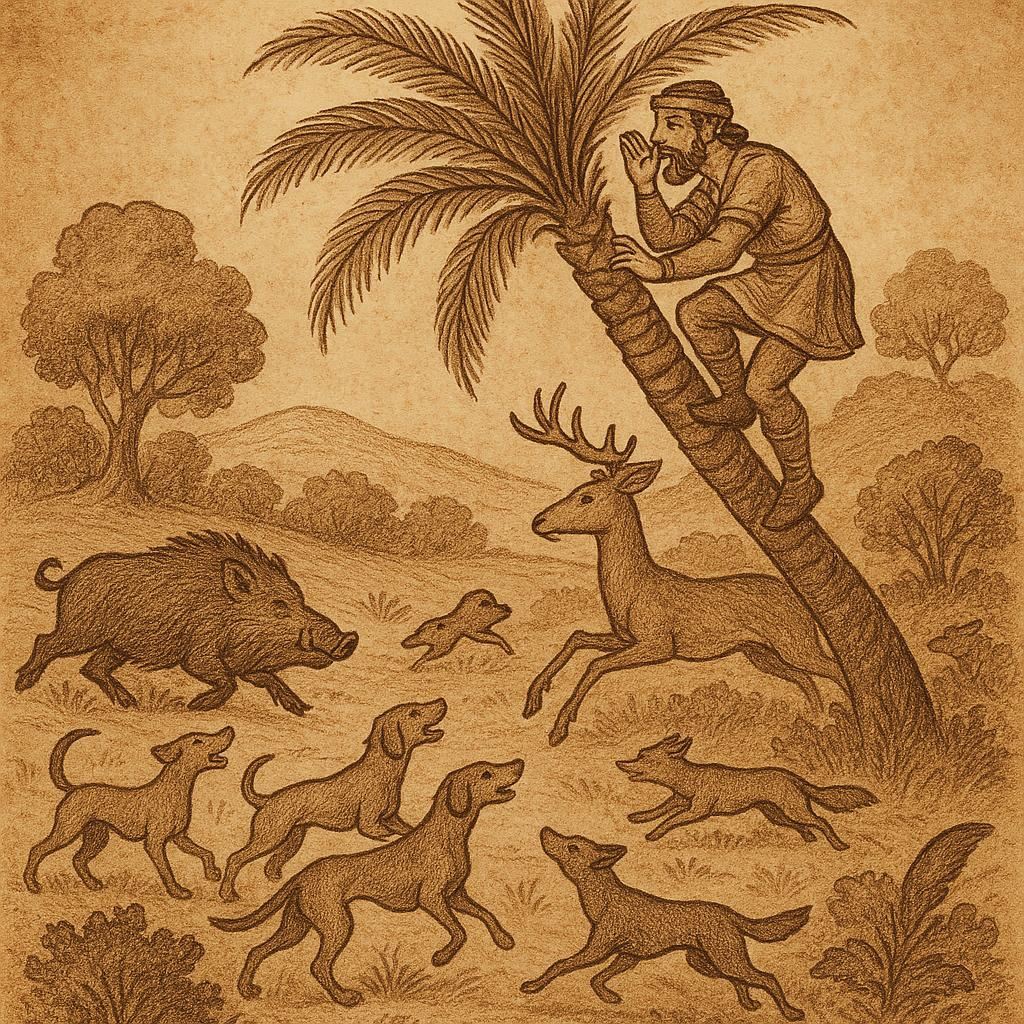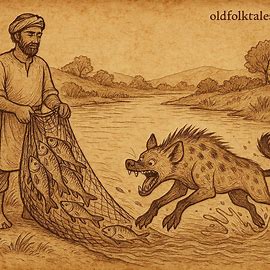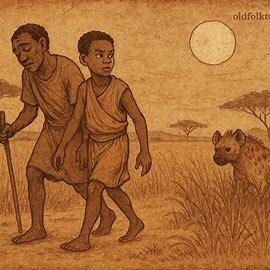The tale begins in a small compound where a hunter lived with his two wives. The first was called Little Loved One, Njidangel, and the second was Little Hated One, Nganyangel. Their names spoke volumes about how the hunter regarded them. Njidangel, despite being favored, did little to help. She shirked her duties, never lifting a hand to maintain the household or assist with chores. By contrast, Nganyangel, though despised, bore the weight of responsibility. She worked tirelessly, keeping the compound in order, ensuring food was prepared, and tending to the needs of both her husband and the home.
The hunter was a man of the forest. He owned many dogs, strong, disciplined hounds trained to follow him on hunts. Every morning, before the sun rose high, he would set out with his pack, disappearing into the bush to provide meat for his family. The rhythm of his life was as steady as the beating of a drum.
But one morning, the hunter chose to do something unusual. He left his dogs behind, locking them in their kennel, and went into the forest alone. As he ventured deeper, the trees grew taller, the shadows darker, and the silence heavier. Soon, danger revealed itself. Wild animals, fierce and unyielding, surrounded him. Their eyes glowed with hunger as they closed in, snarling and advancing.
READ THIS: Pride Humbled by Destiny: An Ethiopian Folktale
With no escape on the ground, the hunter scrambled up a rôn palm tree, clutching its rough trunk as he climbed to safety. But the animals were cunning. They fetched axes and began to chop at the base of the palm. Blow after blow echoed in the forest, and the tree trembled. The hunter, though afraid, remembered his strength. As the tree threatened to collapse, he struck it with his foot. Miraculously, the palm became whole again, its trunk restored.
From his perch at the top, the hunter lifted his voice in song. It was no ordinary song, it was a call, a summons for his loyal companions:
sibi jauru jauru…
call the dogs for me—come, Knaves; come, Striped.
His voice carried across the distance, unheard by people at home but caught by the sharp ears of the dogs. Locked in their kennel, the pack stirred. They recognized their master’s voice and knew he was in danger. With a surge of strength, they broke free, tearing through the compound gate, charging into the forest with unyielding determination.
The dogs blazed a path, their paws beating against the earth, until they found their master. With snarls and fury, they descended upon the wild animals. The battle was fierce, but the dogs were relentless. One by one, the beasts fell under their teeth until the clearing was strewn with silence. The hunter, safe once more, climbed down from the rôn palm.
Grateful for his rescue, he cut away the finest fat from the slain animals and fed it to the dogs. They ate until their bellies were full, tails wagging in satisfaction. With loyalty proven and bellies satisfied, the hunter returned home, his pack faithfully following behind.
When he reached his compound, the hunter demanded to know who had freed the dogs from their kennel. Njidangel, the favored but idle wife, wasted no time. She pointed her finger at Nganyangel, blaming her for releasing them. But the hunter, remembering how the dogs had saved him, spoke with solemnity.
“I did not know friend from enemy today,” he said. “Without the dogs, I would not be here alive. For that, Nganyangel deserves reward. Let her ask for what pleases her most.”
Nganyangel, weary from years of neglect and mistreatment, asked for something dark, something born of resentment. She demanded her rival’s life. “Shave Njidangel’s head clean. Chop it, rub pepper and salt upon it, slit her throat, and place her head at my doorway, so I may strike it each time I go in and out.”
The hunter, bound by his own word and perhaps moved by bitterness of his own, fulfilled her request. Njidangel, the Little Loved One, was slain. Her head was salted, seasoned with pepper, and placed at Nganyangel’s doorway as demanded. And so, betrayal gave way to grim justice, and the hunter’s household was forever changed.
Moral Lesson
This Ethiopian folktale reminds us that loyalty and hard work often go unseen, while idleness and deceit may be rewarded in the short term. Yet in the end, truth, justice, and loyalty reveal themselves, though sometimes in painful ways.
Knowledge Check
Q1: Who were the hunter’s two wives in the Ethiopian folktale?
The wives were Njidangel (Little Loved One) and Nganyangel (Little Hated One).
Q2: What role did the dogs play in the story?
The dogs saved the hunter by fighting off wild animals that surrounded him in the forest.
Q3: Why did the hunter climb the rôn palm tree?
He climbed it to escape the wild animals that had trapped him in the forest.
Q4: How did the hunter reward Nganyangel, the Little Hated One?
He allowed her to ask for whatever she wanted, which led to Njidangel’s death.
Q5: What is the main lesson of the story?
The story teaches about loyalty, justice, and the consequences of idleness and resentment.
Q6: What cultural origin does this folktale come from?
This is an Ethiopian folktale, rooted in traditional storytelling.
Source: Ethiopian folktale






